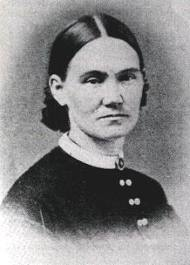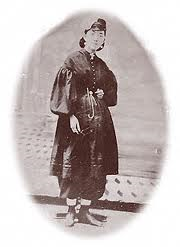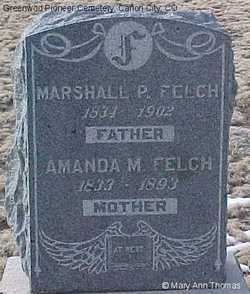 Vermont Patriot, Amanda Farnham, a Union Angel of Mercy, followed her brother and enlisted with him in the 3rd Vermont Volunteer Infantry, during the Civil War. Amanda was feisty and headstrong, learning to perform a man’s chores on her strict father’s rural Vermont farm. When Amanda enlisted, she was appointed a Hospital Matron for the regiment and was even paid the prevailing wages for her service. A Vermont Patriot, she recognized her duty and served her country, enduring the dangers and horrors of combat, from the Peninsula Campaign, to caring for the wounded of the Battles of the Wilderness.
Vermont Patriot, Amanda Farnham, a Union Angel of Mercy, followed her brother and enlisted with him in the 3rd Vermont Volunteer Infantry, during the Civil War. Amanda was feisty and headstrong, learning to perform a man’s chores on her strict father’s rural Vermont farm. When Amanda enlisted, she was appointed a Hospital Matron for the regiment and was even paid the prevailing wages for her service. A Vermont Patriot, she recognized her duty and served her country, enduring the dangers and horrors of combat, from the Peninsula Campaign, to caring for the wounded of the Battles of the Wilderness.
Amanda M. Colburn, was born on November 12, 1833, in West Dover or West Glover, Vermont, on her father’s farm. It is said she married a man named Farnham when she was 23-years-old and had one male child. However, when the Civil War erupted, leaving her son with her parents, she enlisted with her brother in the 3rd Vermont Infantry, in June of 1861. After several months of service, an order from the War Department dictated that nurses would no longer be paid. Amanda stayed on duty as a volunteer nurse and was devoted to the sick and wounded, as a one comrade noted,
“Day or night it made no difference, she always responded to the call, and would
stay until the crisis passed, or death had relieved the patient of his suffering. But it was to the boys, like her brother, that her heart went out with greatest sympathy. Writing letters for such was a daily practice, and when there was no hope she would record the dying request, and take care of some keepsake to be sent to friends at home.”
Mrs. Farnham, as the Union boys called her, did not do regular war duty but went from one regiment to another, wherever she was most needed. Day or night, it made no difference, she always responded to the call and would stay until the crisis was passed or death had relieved the patient of his suffering.
In 1862, Amanda followed the 3rd Vermont on the Peninsula Campaign, in June and July she tended the wounded during the Seven Days Battle, at Antietam she is remembered for extracting a ball from the chest of a comrade, using only a pair of scissors. Mrs. Farnham had the grit and fortitude to accomplish the impossible, not with what she was given, but with whatever little was available. Many lives were saved by her intuition and creativeness.
In December of 1862, Mrs. Farnham, at Fredericksburg, was remembered by a member of the hospital staff of the 4th Vermont, stating,
“Mrs. Farnham, who was stationed at the Burnard House, worked with the wounded
without rest until getting back to the old camps at White Oak Church.”
Before a battle, as at Chancellorsville, it became a common thing for soldiers, especially of the Vermont troops, to intrust her with money or other valuables for safe keeping. After retiring for the night, Amanda was awakened by someone trying to enter her tent. She grabbed her revolver and fired at the intruder, in the darkness. The would be robber fled, without any ill gotten treasure and the next morning a new recruit, reported to the hospital wounded, accidentally shot by his tent mate. Amanda did not file a report of the attempted robbery, assured that her assailant had gotten his just deserts.
On the march to Gettysburg, one trooper stated,
“The last day they went thirty-four miles over a stone road, and under a burning
sun . . . Mrs. Farnham went with them, and most of the way on foot, giving up
the spare room on her wagon to worn-out soldiers . . . Thus many more were able
to keep along than would have been without such help. Again, when she found a
poor fellow with blistered feet, she gave him a pair of new socks to take the
place of the holes, all that was left of his own.”
 When Amanda enlisted in the 3rd Vermont, she had worn a uniform of full pants, buttoning from the top of her boots, skirts falling a little below the knees and a jacket with full length sleeves. When Mrs Farnham was eventually ordered to report to Miss Dorothea Dix for hospital duty, Miss Dix examined Amanda from head to foot until the situation became embarrassing. Finally Dix said,
When Amanda enlisted in the 3rd Vermont, she had worn a uniform of full pants, buttoning from the top of her boots, skirts falling a little below the knees and a jacket with full length sleeves. When Mrs Farnham was eventually ordered to report to Miss Dorothea Dix for hospital duty, Miss Dix examined Amanda from head to foot until the situation became embarrassing. Finally Dix said,
“Mrs. Farnham, the dress you wear is abominable, a most abominable dress, and I do not wish one of my nurses to dress in that manner; but you came highly recommended and I have long known of your work. But I did not know you wore such a dress. However, you can wear it if you choose.”
Amanda Farnham became one of Dix’s most trusted nurses and ward supervisors, no matter how she was dressed.
Amanda served at Fredericksburg, Virginia, where the wounded were being taken from the battlefields of the Wilderness and Spotsylvania, until the end of June, when she was summoned to White House on the Pamunkey. Amanda established a plan to wash all clothing and bedding used by the wounded so that they could be used again. Upon the establishment of hospitals at City Point, Amanda was appointed by Miss Dix to, “take entire charge of this new department at the 6th Corps Hospital.”
Amanda Farnham had met and fallen in loved with a hospital steward of the 4th Vermont, Marshall P. Felch. After their Civil War service ended, they were married on December 16, 1865 and with Amanda’s teenage son, the Felch’s eventually moved to a small town outside of Denver, Colorado.
 Amanda Felch applied for and received a $12.00 pension for her service during the Civil War, granted by Congress on March 3, 1891. Amanda died, in a Denver hospital on December 31, 1893, followed by her husband, Marshall in 1902. They rest together at the Greenwood Pioneer Cemetery, Canon City, Colorado.
Amanda Felch applied for and received a $12.00 pension for her service during the Civil War, granted by Congress on March 3, 1891. Amanda died, in a Denver hospital on December 31, 1893, followed by her husband, Marshall in 1902. They rest together at the Greenwood Pioneer Cemetery, Canon City, Colorado.
Vermont Patriot, Amanda Matilda Colburn Farnham Felch, will always be remembered as the caring and dedicated, Mrs. Farnham, by her Vermont heroes, but the United States will be forever indebted to her dedication and loyalty, as a unparralled Union Angel of Mercy.
Bummer


Great story. Brings history alive. This young woman actually did what Jo March (of L.A. Alcott”s Little Women fame) would like to have done.
Thank you.
Nancy,
Thanks for the read. Find it fascinating how these women joined the Union combat effort, doing what they could for the troops on the front lines. Often putting themselves in harms way to care for the sick, wounded and dying. Performing many miracles with just their feminine presence and compassion.
Bummer